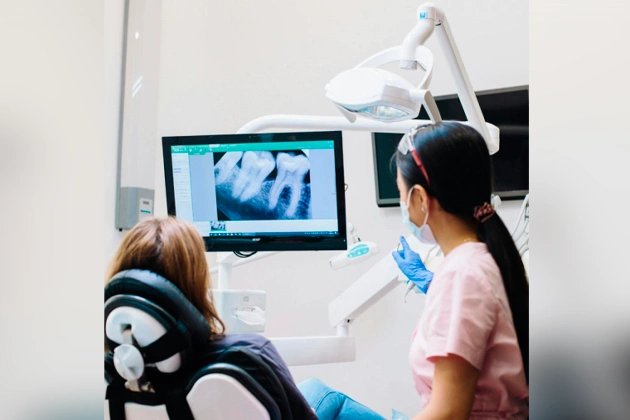Selecting the right dentures in Seattle, WA, involves understanding various types like complete, partial, immediate, and overdentures, each catering to specific needs. Consider the materials—acrylic resin, porcelain, or flexible nylon-based—for their impact on durability and comfort. Evaluate how your lifestyle, including diet and physical activities, affects your choice. Collaborate with a qualified dentist who emphasizes patient-centered care. Ready to explore tailored denture solutions that fit your unique requirements?
Understanding Different Types of Dentures
When considering dentures, what are the primary types you should know about? There are several, each with distinct denture base designs and tooth replacement options. Complete dentures replace all teeth in either the upper or lower jaw. They rely on a full acrylic base design that adheres to your gums via suction. In contrast, partial dentures replace a few missing teeth and often use a metal framework for stability, clasping onto adjacent natural teeth. Immediate dentures are a temporary solution, fitted right after tooth extraction, allowing you to move forward smoothly while your tissue heals. Overdentures, supported by dental implants, offer enhanced retention and stability. For those seeking custom dentures in Seattle, WA, a qualified specialist can recommend the best type and fit based on your oral structure and lifestyle needs, ensuring personalized and effective results.
Comparing Denture Materials
While choosing the right dentures, understanding the materials available can greatly impact both comfort and durability. Acrylic resin is commonly chosen for its lightweight nature and affordability. However, its denture durability may not match that of other materials. Porcelain, on the other hand, offers superior denture appearance due to its natural translucency, closely mimicking real teeth. Yet, it’s heavier and can wear down opposing teeth. Flexible nylon-based materials provide comfort through their adaptability to mouth contours, though they might sacrifice some durability. Metal frameworks, typically made from cobalt-chromium alloys, enhance structural strength and longevity, albeit at a higher cost and reduced aesthetic appeal. Each material’s unique properties influence both the functional lifespan and visual integration of your dentures, ensuring a personalized fit.
Assessing Your Lifestyle Needs
When selecting dentures, it’s vital to evaluate how your daily routines and dietary habits influence your choice to guarantee ideal comfort and functionality. Consider the frequency and type of physical activities you engage in, as studies indicate that highly active individuals may benefit from more robust denture options. Additionally, if your diet includes hard or sticky foods, you’ll need dentures designed with materials that provide increased durability and resistance to wear.
Daily Routine Considerations
Selecting the right dentures involves understanding how they will integrate into your daily routine and lifestyle. Examine your daily hygiene regimen and any denture adjustment concerns you might face. Proper integration requires evaluating how dentures affect your day-to-day activities.
- Time Commitment: Assess the time required for cleaning and maintenance within your daily hygiene regimen.
- Comfort Level: Determine if frequent denture adjustment concerns might disrupt your routine.
- Active Lifestyle: Identify if your denture choice supports physical activities or if modifications are necessary.
- Social Interactions: Evaluate how your dentures will impact speech and confidence in social settings.
Comprehending these aspects guarantees your dentures fit seamlessly into your lifestyle, enhancing comfort and usability.
Dietary Habits Impact
Understanding how your dentures will mesh with your dietary habits is essential in ensuring they meet your lifestyle needs. If your dietary choices include hard or sticky foods, it’s pivotal to select dentures that offer superior fit and stability. Ill-fitting dentures can lead to inadequate mastication, compromising your ability to break down food efficiently, thus impacting your nutritional needs. Studies indicate that patients with well-fitted dentures maintain a more diverse diet, vital for balanced nutrition. Additionally, consider the material of the dentures, as some are designed to withstand more rigorous chewing. By evaluating your dietary habits, you can choose dentures that not only align with your nutritional requirements but also enhance overall comfort and functionality, supporting a healthy, balanced diet.
Budget Considerations for Dentures
While considering dentures in Seattle, WA, it’s crucial to analyze your budget as part of the decision-making process. An effective budgeting approach guarantees affordability without compromising quality. Here’s how to streamline your financial planning:
- Assess insurance coverage: Evaluate if your dental insurance covers any portion of denture costs to ease financial strain.
- Evaluate material preferences: Different materials come with varied price points; choose cost-effective options that suit your needs.
- Explore payment plans: Many dental clinics offer financing plans, providing flexibility in managing expenses over time.
- Research community resources: Look into local programs or discounts for affordable denture solutions.
Employing these strategies helps you make informed, budget-conscious decisions, ensuring ideal comfort and fit without exceeding financial limits.
Consulting With a Qualified Dentist
When contemplating dentures, consulting with a qualified dentist becomes indispensable to guarantee satisfactory comfort and fit. Begin by evaluating the dentist’s communication skills, as effective dialogue is essential for understanding your unique needs and preferences. A dentist who listens attentively and explains treatment options clearly enhances decision-making and promotes confidence in the process.
Assessing a patient-centered approach is equally paramount. A qualified dentist prioritizes personalized care, tailoring denture solutions to your specific oral anatomy and lifestyle. Evidence suggests that customized treatment plans result in superior outcomes, minimizing discomfort and maximizing functionality. Additionally, observe the dentist’s ability to integrate your feedback into the treatment plan, ensuring a collaborative environment. This fosters trust and ensures that your journey towards achieving perfect denture comfort is both informed and supportive.
Importance of Proper Denture Fit
A properly fitting denture is a cornerstone of successful dental prosthetics, directly impacting both comfort and functionality. When ensuring denture stability, a precise fit is essential. Proper denture comfort is achieved through meticulous customization, substantially reducing the risk of irritation and enhancing oral health. Misfit dentures can lead to sore spots, slippage, and even difficulty in speaking or eating, detracting from the intended benefits.
Consider these critical aspects for a proper fit:
- Accurate measurements: Essential for alignment and avoiding pressure points.
- Material selection: Impacts flexibility, weight, and overall comfort.
- Regular adjustments: Necessary to accommodate changes in your oral structure.
- Professional follow-up: Key to maintaining excellent function and comfort over time.
Exploring Partial Denture Options
Partial dentures are an excellent solution for those missing one or more teeth, providing both aesthetic and functional benefits. When selecting removable partial options, it is indispensable to ponder the denture clasps design, which secures the denture to your existing teeth. These clasps guarantee stability during mastication and speech, enhancing comfort. Materials like cobalt-chrome are often used for their durability and lightweight properties. Precision attachments or flexible clasps may be recommended for a more natural appearance, decreasing visible metal. It is imperative to confer with your dental professional about the type of clasp that best fits your oral structure. Evidence suggests that well-designed partial dentures can dramatically improve oral function and aesthetics, making them a valuable choice for restoring dental integrity.
Maintenance and Care Tips
To guarantee your dentures remain comfortable and fit well over time, it’s indispensable to establish a daily cleaning routine using a non-abrasive cleanser, which helps prevent bacterial buildup and staining. Appropriate storage techniques, such as keeping dentures in a moist environment when not in use, are essential to maintain their shape and prevent warping. Additionally, scheduling regular dental check-ups allows for professional assessments and adjustments, minimizing the risk of oral health issues and ensuring ideal denture performance.
Daily Cleaning Routine
Maintaining your dentures in top condition hinges on a thorough daily cleaning routine that effectively removes food particles and microbial buildup. Implementing proper cleaning methods guarantees your oral health remains ideal. Start by rinsing your dentures under lukewarm water to dislodge loose debris. Utilize a soft-bristled brush and non-abrasive cleanser for gentle yet effective scrubbing, focusing on all surfaces to prevent plaque accumulation. Don’t forget to rinse thoroughly to eradicate any cleanser residue, which could irritate oral tissues. Incorporate these hygienic practices into your routine:
- Brush your dentures daily to eliminate plaque and stains.
- Soak dentures overnight in a denture-safe solution.
- Avoid using hot water to prevent warping.
- Schedule regular dental check-ups for professional cleaning and fitting assessments.
Proper Storage Techniques
Proper care for your dentures doesn’t end with cleaning; storing them correctly is equally important to safeguard their longevity and fit. Denture storage methods involve immersing them in a suitable solution to prevent warping and bacterial growth. Always use a denture cleanser or plain water—never hot water, as it can distort their shape. Proper denture storage requires a closed container to avoid exposure to dust and contaminants. Guarantee the container is labeled and used exclusively for this purpose. Dentures should remain moist to maintain their form; dryness can lead to discomfort or improper fit when worn. Evidence suggests that consistent moisture retention enhances the material’s resilience, securing your dentures remain comfortable and effective over time.
Regular Dental Check-ups
While regular dental check-ups might seem routine, they’re essential for guaranteeing your dentures remain comfortable and functional. During these appointments, your dentist can assess and maintain your oral health, enhancing both fit and longevity of your dentures. Regular check-ups are pivotal for identifying any potential issues early, such as gum irritation or denture misalignment. Prioritizing dental hygiene is key for supreme denture performance.
- Evaluate Fit: Ensure your dentures fit well to prevent discomfort or sore spots.
- Adjustments: Allow your dentist to make necessary adjustments for improved comfort.
- Professional Cleaning: Benefit from professional cleaning to remove plaque buildup.
- Oral Health Assessment: Regularly monitor underlying oral health to maintain gum and bone health.
These practices reinforce the importance of regular check-ups in your dental care routine.
Evaluating Long-term Denture Solutions
To guarantee you choose dentures that provide long-term comfort and functionality, it’s imperative to evaluate the various solutions available with a focus on material durability, adaptability, and cost-effectiveness. Consider materials like acrylic, chrome cobalt, and flexible resins, each offering unique benefits. Acrylic offers affordability but may require more frequent adjustments, impacting long-term cost implications. Chrome cobalt provides strength and longevity, minimizing replacements. Flexibility in resins enhances gum health maintenance by reducing pressure points. Evaluate adaptability to gum changes over time; dentures with adjustable features to ascertain a better fit as your gums naturally shift. Though initial costs might vary, prioritize options with proven durability and adaptability to minimize future expenses and maintain optimal oral health.
Finding a Reliable Dental Provider in Seattle
When selecting a dental provider in Seattle, it is essential they possess the necessary credentials and substantial experience in prosthodontics, as this directly impacts the quality of your denture fit and comfort. It’s also pivotal to weigh the clinic’s location and accessibility, as regular visits may be required for adjustments and maintenance. Research shows that proximity to your dental provider can greatly improve adherence to follow-up appointments, thereby enhancing overall treatment outcomes.
Credentials and Experience
Selecting a dental provider in Seattle for your dentures requires scrutinizing their credentials and experience, as these are critical indicators of their expertise and reliability. Begin by verifying the dentist’s academic credentials, as these reflect formal training and mastery in dentistry. Guarantee they have significant hands-on experience, which demonstrates practical proficiency in fitting and adjusting dentures. Evaluate their track record through patient reviews and testimonials, providing insight into patient satisfaction and successful outcomes. Consider their professional affiliations with reputable dental organizations, which often require adherence to high standards and ongoing education.
- Verify academic credentials for formal training.
- Assess hands-on experience for practical skills.
- Review patient feedback for satisfaction indicators.
- Check memberships in professional organizations for quality assurance.
These steps guarantee you’re choosing a qualified and dependable provider.
Location and Accessibility
While credentials and experience are pivotal in selecting a dental provider, the importance of location and accessibility can’t be overlooked. In Seattle, a provider’s proximity to your residence or workplace significantly influences your ability to maintain regular appointments. Opt for a clinic offering convenient office hours that align with your schedule, reducing the need to disrupt your day for dental visits. Additionally, evaluate the transportation options available. A clinic near public transit routes or with ample parking can facilitate smoother visits. Evidence suggests that ease of access correlates with patient adherence to dental care plans, ultimately impacting oral health outcomes. Prioritizing a provider with strategic location and accessible facilities guarantees a seamless integration of dental care into your daily routine.
Frequently Asked Questions
How Can I Manage Discomfort During the Initial Adjustment Period?
During the initial adjustment period, manage discomfort by gradually increasing wear time, allowing your mouth to adapt. Use denture adhesive to stabilize fit, which enhances comfort. Studies show adhesives can markedly/considerably reduce irritation and promote effective adaptation.
Are There Any Dietary Restrictions With New Dentures?
Yes, with new dentures, you’ll initially need soft food choices to aid adjustment. Focus on nutrition planning by including mashed potatoes, yogurt, and smoothies, ensuring balanced nutrient intake while reducing stress on your gums and dentures.
Can Dentures Affect My Speech, and How Can I Improve It?
Yes, dentures can affect your speech initially. Improve articulation by practicing specific exercises like reading aloud and using speaking techniques that focus on clarity. Evidence shows these methods enhance speech adaptation with new dentures over time.
What Should I Do if My Dentures Break Unexpectedly?
If your dentures break unexpectedly, don’t try DIY fixes. Seek emergency denture repair to prevent further damage. Contact your denture specialist promptly for professional assessment and repair, ensuring proper alignment and function are restored efficiently.
How Often Should I Have My Dentures Professionally Checked or Adjusted?
You should have your dentures professionally checked or adjusted every six months. Regular dental checkups guarantee proper denture maintenance, preventing discomfort and misalignment, and maintaining your oral health by identifying potential issues early through evidence-based practices.










